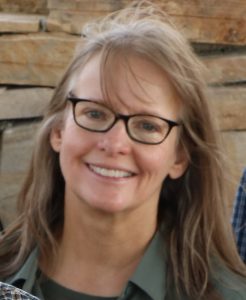Located within the Department of Psychology and College of Natural Sciences at Colorado State University, our dedicated team of professionals includes researchers and college professors experienced in fields of psychology, addiction counseling, data management, statistical analysis and project management. Most of the team earned Ph.D.’s in their respective disciplines. Regardless, our entire team works together to achieve group goals and yield results.
Randy Swaim, Ph.D.

Randy Swaim, Ph.D.
Director, Tri-Ethnic Center for Prevention Research
Senior Research Scientist
Licensed Psychologist
Professor, Department of Psychology
Dr. Swaim is the current Director of the Tri-Ethnic Center and is a Principal Investigator (with Linda Stanley) on two National Institute of Drug Abuse (NIDA) R01 grants. One grant , a continuation since 1974, examines the epidemiology and etiology of American Indian youth living on or near reservations. The second grant tests the effectiveness of the Be Under Your Own Influence communications campaign targeted to reducing substance use among American Indian middle school youth. He and Dr. Stanley were PIs on a National Institute on Alcohol Abuse and Alcoholism (NIAAA) grant to examine contextual effects on rural adolescent alcohol use. With training in counseling psychologist, he has conducted research studies of adolescent substance use, anger, and violence for the past 33 years. He has been funded by NIDA, NIAAA, CDC, OJJDP, and the Colorado Tobacco Research Program.
Linda Stanley, Ph.D.

Linda Stanley, Ph.D.
Senior Research Scientist
Dr. Stanley is a Principal Investigator (with Randy Swaim) on two National Institute of Drug Abuse (NIDA) R01 grants. One grant examines the epidemiology and etiology of American Indian youth living on or near reservations. The second grant tests the effectiveness of the Be Under Your Own Influence communications campaign targeted to reducing substance use among American Indian middle school youth. She has been a past PI on a grant from NIAAA that examines individual and contextual effects of rural and non-rural adolescent alcohol use, and she performs statistical analysis on a number of other grants. Dr. Stanley’s work has focused on a variety of public policy, social, and consumer issues and has been interdisciplinary in nature. Dr. Stanley was also the Director of Community Readiness Programs at TEC for a number of years, working with many different organizations such as Boston Medical Center, the states of Wisconsin and Michigan, and University of Western Ontario’s Medical Center to address public health issues in minority and other communities.
Mark Prince, Ph.D.

Mark Prince, Ph.D.
Research Scientist
Assistant Professor, Department of Psychology
Associate Director of Addiction Counseling
Dr. Prince’s research is focused on identifying mechanisms of behavior change in addiction and on developing interventions targeting these mechanisms. He is also a principal investigator on the American Indian epidemiology grant from NIDA.
Meghan Crabtree, Ph.D.

Meghan Crabtree, Ph.D.
Research Scientist
Dr. Crabtree earned her Ph.D. in psychology from the University of Texas at San Antonio in 2018. Her dissertation focused on the implications of authentic identity construction and management for behavioral health and psychological well-being. As a postdoctoral research fellow with the Tri-Ethnic Center for prevention research, she applies a self and identity-based theoretical framework to investigate the complex role of social (specifically cultural and ethnic) identity in American Indian (AI) youth’s drug use behaviors, attitudes and decision-making. Her current work follows two lines of research: 1) developing both psychometrically sound and culturally congruent measures of AI identity, and 2) investigating the role of identity-based needs and strength-based characteristics in promoting healthy behaviors among AI youth. Working closely with TEC investigators, she is primarily responsible for the statistical analysis and dissemination of findings from Our Youth, Our Future, a project (R01) funded by the National Institutes of Drug Abuse (NIDA) investigating the epidemiology and etiology of substance use behaviors among American Indian youth.
Stacy Biggerstaff, M.S.

Stacy Biggerstaff, M.S.
Statistician/Data Manager
Ms. Biggerstaff is Data Manager on two National Institute of Drug Abuse (NIDA) R01 grants. One grant examines the epidemiology and etiology of American Indian youth living on or near reservations. The second grant tests the effectiveness of the Be Under Your Own Influence communications campaign targeted to reducing substance use among American Indian middle school youth. She is responsible for designing online surveys for data collection and assuring the validity of the collected data in preparation for analysis and reporting. Ms. Biggerstaff has been the Data Manager at the Tri-Ethnic Center for 20 years and has worked on a number of other grants. She has a M.S. in Statistics from Colorado State University and a B.A. in Math from Kenyon College.
Field and Operations Director

Field and Operations Director email
Field and Operations Director (970) 491-3895
Our Affiliated Staff:
 Brad Connor, Ph.D.
Brad Connor, Ph.D.
Associate Professor, Department of Psychology, Director of Addiction Counseling
Dr. Connor conducts thematic research focusing on the etiology and negative outcomes of sensation seeking, emotion dysregulation and impulsivity across the lifespan.
 Kim Henry, Ph.D.
Kim Henry, Ph.D.
Professor, Department of Psychology,
Dr. Henry’s work focuses on the psychological and social factors that produce or mitigate the health risking behaviors of adolescents and young adults. My goals are to develop and test theoretical models in order to understand the complex interactions of risk, promotive, and protective factors that influence these risk behaviors and, ultimately, to create and test methods for prevention.

Fred Beauvais, Ph.D.
Dr. Beauvais was the original Principal Investigator of the long-running National Institute on Drug Abuse grant examining the epidemiology and etiology of American Indian adolescents who live on reservations. Fred is now retired but continues to advise and review on matters related to adolescent substance use.
